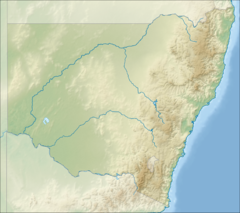Crowdy Head Light

Crowdy Head Light, 2008
|
|
|
New South Wales
|
|
| Location |
Crowdy Head New South Wales Australia |
|---|---|
| Coordinates | 31°50′36.32″S 152°45′12.79″E / 31.8434222°S 152.7535528°ECoordinates: 31°50′36.32″S 152°45′12.79″E / 31.8434222°S 152.7535528°E |
| Year first constructed | 1878 |
| Automated | 1928 |
| Foundation | concrete slab |
| Construction | limestone |
| Tower shape | cylindrical tower with balcony and lantern attached to one-story service builtding |
| Markings / pattern | white tower and lantern |
| Height | 24 feet (7.3 m) |
| Focal height | 201 feet (61 m) |
| Original lens | 4th order fixed catadioptric |
| Light source | mains power |
| Intensity | 28,000 cd |
| Range | white: 16 nautical miles (30 km) red: 13 nautical miles (24 km) |
| Characteristic | Fl (2) W 10s. Fl R (to northeast.) |
| Admiralty number | K2784 |
| NGA number | 111-6028 |
| ARLHS number | AUS-062 |
| Managing agent | Australian Maritime Safety Authority |
| Heritage | Australian Department of Environment |
Crowdy Head Light is an active lighthouse located at Crowdy Head, a headland between Forster and Port Macquarie, New South Wales, Australia. It is registered with the Register of the National Estate.
The first station in the area was a pilot station established in 1860 at nearby Harrington, assisting ships navigating the entrance of the Manning River.
The current lighthouse is the last of five lighthouses of similar design designed and built by James Barnet in 1878-80, the other four being Fingal Head Light, Clarence River Light (now demolished), Tacking Point Lighthouse and Richmond River Light. The original light was a fixed white light from a 4th order catadioptric apparatus with an intensity of less than 1,000 cd. It was manned by one keeper.
In 1928 the apparatus was converted to a carbide lamp (acetylene gas), with an intensity of 1,500 cd. At the same opportunity the light was automated.
The pilot station was closed in the 1960s. In 1972 the light was converted to mains electricity.
In 2002 the 4th order Fresnel lens was sold on eBay in 2002 for $20,000, and is now on display at Sea Girt Light in New Jersey.
...
Wikipedia

